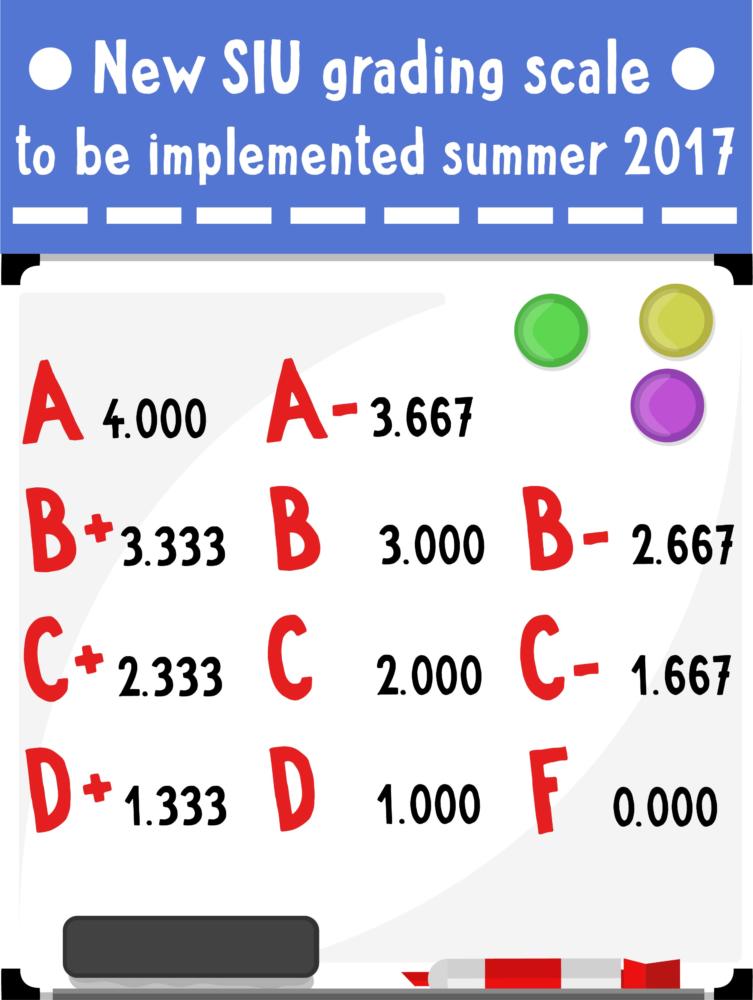Plus-minus grade system to go into effect during summer semester
May 5, 2017
University faculty will be able to assign plus and minus grades for undergraduate and graduate courses starting in the summer of 2017.
The Faculty Senate and Graduate Council brought resolutions to the Registrar’s office during the fall of 2016, at which point university administration decided to implement the new system. Judy Davie, president of the Faculty Senate, said the change was advocated by both instructors and students who wanted a grading scale that would give better feedback.
“There’s a big difference between a 90 and a 100,” Davie said. “Many faculty support the plus-minus system because they feel it allows them to give a grade that more accurately reflects the effort of the student.”
Advertisement
This change will make it so each grade will go down about one-third from the previous grade’s value. For example, an A would be worth four points and an A-minus would be worth 3.667 points. Both letter grades would still be marked as excellent.
The grading scale in place now is a four-point system that assigns a grade point average value of four points for an A, three for a B, two for a C, one for a D and zero for an F.
Davie said this also makes SIU compatible with other universities that use the plus-minus system.
Currently, if a student transfers from a university with a plus-minus grade scale, SIU officials have to go back over the student’s transcript and recalculate the GPA, Davie said.
“Most people it probably doesn’t hurt, change or affect,” Davie said. “But I hate to take the credit from any student for the grade they received.”

Students may be concerned about their GPA dropping as a result of the new scale, Davie said, but a detailed analysis of universities that already have a plus-minus system found that this is not the case.
Advertisement*
“The net effect on GPA was negligible,” Davie said. “They don’t go up, they don’t go down.”
Johnathan Flowers, president-elect of the Graduate and Professional Student Council, said the grade scale change gives instructors more flexibility in their courses.
“As it stands, a student who gets an 80 percent functionally has done the same amount of work as a student who gets an 85 percent,” said Flowers, who is a teaching assistant for the education and women, gender and sexuality studies departments. “This also allows a professor to give a student a B minus where currently it might have been be a C.”
The scale change has been in the works for the past five or six years, Davie said.
Davie said during that time period, the Graduate Council and Faculty Senate passed resolutions in support of the new grade system but nothing came of them because the electronic gradebook used by instructors didn’t support pluses and minuses.
Tamora Workman, director of the Registrar’s Office, said the change will only affect grades given after the 2017 summer intersession. Any college-level work completed prior to summer 2017, whether at SIU or another institution, will not be assigned plus or minus grades, she said.
Transcripts will come with a note on the back indicating the change in grading systems as of the summer of 2017, according to the Registrar’s Office website.
Davie said some might question the new system’s lack of an A-plus grade. She and other faculty members fought for it, but Davie said the university’s electronic gradebook wouldn’t support assigning four points for both an A and an A plus.
It will be up to instructors to decide what range will make up each letter grade, which Davie said will allow grades to be curved more easily.
“My A is always a little below a 90, and my B is always a bit lower than an 80,” said Davie, who teaches biochemistry. “To mandate the ten point scale didn’t seem fair to faculty.”
Flowers said if a student feels that a faculty member has developed course objectives and grade ranges that are not fair to the students, students can address it with the dean or the chair of their department.
“Faculty are charged with providing reasonable expectations for student learning outcomes in their development of course curricula,” Flower said.
Some programs and units have GPA requirements to remain in good standing, such as the Honors Program and the Graduate School. Davie said as far as she knows, those requirements will stay in place.
“Where a B used to cut it, now a B-minus isn’t going to cut it,” Davie said. “That’s why I think people need to be very aware that this change is happening.”
Davie said she hopes the scale change will provide an incentive for students to strive for higher grades.
“There have been students where it simply killed me to give them a B for something that was so close to an A, and now I feel like I can give them a little bit more,” Davie said. “I think the same thing is true for the low end of the scale — I hope this serves as a motivator.”
Staff writer Marnie Leonard can be reached at mleonard@dailyegyptian.com or on Twitter @marsuzleo.
To stay up to date with all your southern Illinois news, follow the Daily Egyptian on Facebook and Twitter.
Advertisement











Jacob Rexilius • May 9, 2017 at 8:05 pm
Hello, I am a student at SIU currently and this entire “it won’t lower your GPA” is entirely ridiculous. Unless the entire grading scale changes it is going to lower GPA. All the students who are getting A- now will get a 3.6 instead of a 4. I believe this is very unfair.